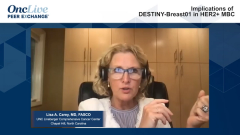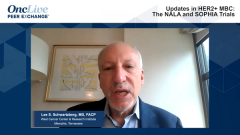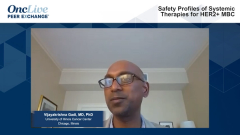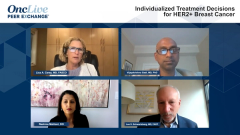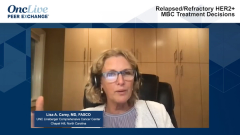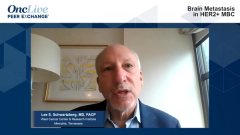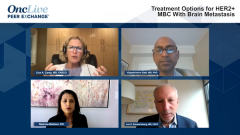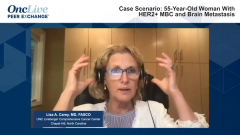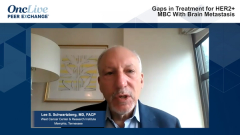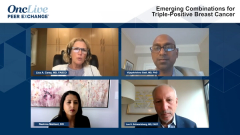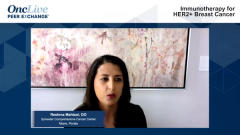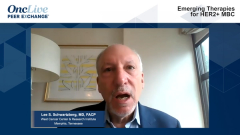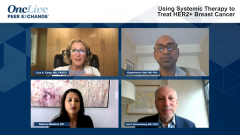
Treatment Options for HER2+ MBC With Brain Metastasis
Options available to treat patients with HER2-positive metastatic breast cancer and brain metastasis, and factors that impact choice of therapy based on CNS data demonstrated in several clinical trials of HER2-targeted agents.
Episodes in this series

Lisa A. Carey, MD, FASCO: You’ve all raised some interesting points. There’s 1 thing that’s really crucial. The first is a lot of our drugs in existing brain metastases cross the blood-brain-barrier because, in existing brain metastases, the blood brain barrier is disrupted. That’s why gadolinium—is a big, heavy molecule—gets in. That’s why can see them, and why the subset analyses in stable brain metastases suggest the drugs we use are effective. Prevention of the development of brain metastases requires a different kind of drug. That may be because, as you’re noting, V.K., the incidence of brain metastases is part of the first progressive event and wasn’t altered by T-DM1 [trastuzumab emtansine] in the KATHERINE study. It was about 5% in both arms. We may end up with a different algorithm. But I don’t know, in the metastatic setting, if that matters for existing brain metastases.
Lee, I have 1 take-home point from what you’re saying. I don’t do surveillance unless the patient has some symptomatology or I pick up something on an exam. I have the same algorithm as you do. I have a low threshold. But I’m not looking for it for the reason of once you find it, you do what do, and end up with patients getting 12 lesions buzzed, while you would have rather gotten them started on their systemic therapy. It’s not entirely clear if that’s the right thing to do. I have to say, my approach is that I don’t look unless I want to know.
Any other comments about that? We’re going to talk about specific drugs. I’d like to, anyway, because it’s true that there are very limited data in this setting that we’re getting into.
Vijayakrishna Gadi, MD, PhD: There’s a dorky scientific point out there that uses SRS [stereotactic radiosurgery] as a treatment modality compared with conventional radiation therapy. It’s high energy and, as a result, you get a liquefactive tumor death in the breast tissue. That’s potentially highly immunogenic. There’s a lot of interest in looking at SRS and trying to understand—and unpack—how we’re going to do something different with the immune system and get a better immune response. I know it’s early, but I find that to be an absolutely fascinating concept.
Lisa A. Carey, MD, FASCO: That’s really interesting. As we start doing more immunotherapy combined with everything, these might be a good option. There are quite a few trials trying to look further into various permutations of radiation and immune checkpoint inhibition. Any other comments? As far as I know, the only trials that allowed active brain metastases, as we’ve talked about, was HER2CLIMB. As for everything else we’ve talked about, with these newer drugs, they all allowed stable brain metastases, right? Did any of the trials exclude brain metastases? I’m not aware of any. They all included them, and then reported on the stable brain metastases population vs the non-progression-free—but not intra–CNS [central nervous system] progression. That’s a hard thing to do. I don’t think any of the trials have addressed it. This is an area of unmet need. Reshma, are there more trials for us?
Reshma Mahtani, DO: Yeah. As we look at how to utilize these therapies, as you pointed out, having the inclusion criteria on some or many of these studies about being able to stabilize brain metastases—even in NALA—is important. Although we saw a longer time to intervene for brain metastases in NALA, there weren’t patients that had active, untreated brain metastases, and that’s unique to the HER2CLIMB data.
Lisa A. Carey, MD, FASCO: We should push for that when companies are developing these trials.
Transcript Edited for Clarity



